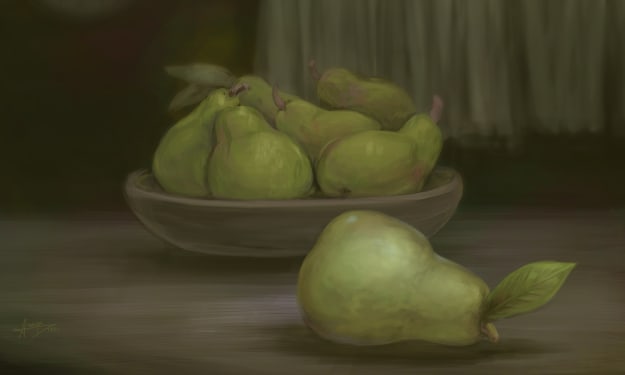The Past Provides Strength
But You Can't Eat Memories

The can of spaghetti loops had expired over twenty years ago. I hefted it in my hand, considering. The weight seemed on point, and I didn’t hear any rattling.
“Looks like we’ll be eating tonight,” I told Rhonda, displaying the tin can with a light jazz hand. “Spaghetti loops.”
Across the bunker, kneeling with her head ducked inside a long wooden trunk, Rhonda twirled a whoop-de-doo with her finger. I slipped our evening rations under the flap of my canvas bag and turned from the moldering shelves to join her. As I cornered a square table between us, the spikey scent of cedar fragranced air that otherwise smelled stale and dusty.
“You find anything?”
Rhonda’s ponytail flailed as it tried to keep up with her shaking head. It seemed relieved to settle behind her as she straightened and sat on her heels with a beleaguered sigh.
“A few useful sundries - bed sheets and blankets, mostly - but the rest is just a load of sentimental garbage. It’s amazing what people cared about back in the day.”
“Oh, yeah?” I craned over her curiously. “Like what?”
Rhonda scooched aside, rolling her eyes at my eagerness to plunder the past’s buried treasures. I dove in to rifle the chest’s contents, pulling out a stack of framed photographs and scrapbooks, a small heap of cheap jewelry, and a scattering of random tchotchkes. Certain mementos defied classification, seeming like so much literal junk without the context of the owner’s memories.
I held up a palm-sized hunk of polished stone, flat everywhere but for its broken edge.
“What do you think? A remnant from some sacred altar?” I asked.
“Probably a chunk of someone’s kitchen counter,” Rhonda sneered.
I turned it over in my hands, absently contemplating the swirling grains of pink and green. Sacred altar or kitchen counter: time had rendered them the same in more ways than one.
Rhonda rose to her feet.
“Why would anyone bring all this useless stuff in a survival bunk? These people were the last remnants of civilization. They holed up here to survive the apocalypse, and they thought to bring this cheesy trinket.” She plucked a heart-shaped locket from the mound of jewelry. “What good is a locket except to make you look back?”
I shrugged philosophically. “Maybe they wanted to look back. To remember the way things were. To make themselves feel good.”
“Looking back never makes me feel good.” Rhonda fumbled with the clasp, her gloved fingers giving her difficulty with the tiny catch. “I hate looking back. There’s nothing you can do with what’s behind you. The only logical way to look is forward. Ahead.”
“Some people find the past hopeful.” I set down the stone slab to stand in defense of the memory-hoarders.
Rhonda scoffed. “What’s hopeful about the past? Hope only applies to things that haven’t happened yet.”
I tipped my head in due concession to her point, but I stubbornly refused to yield. “Well, it makes them feel stronger, then. Looking to the past reminds people of what they have accomplished, what they have survived, and even of what could be possible in the future. Forward is so uncertain, but back is unchanging. Back is stable.”
Now obsessively trying to pry open the locket, and failing, Rhonda refused to give up ground.
“Back is obsolete,” she said. “It’s over and gone. People stare back into the past out of weakness. These people were weak.”
With a frustrated jerk of her head that made her ponytail kick, she flung the necklace in the dust at my feet.
“That locket was trite and cliché even before the apocalypse,” she finished sourly. “As expired as that can of spaghetti loops.”
I snatched the locket from the floor. As I bent, the tin can clunked out of my bag. It rolled across the bunker to knock at Rhonda’s boots.
Before she could pick it up and throw it at me, “You’ll devour those spaghetti loops once we get them open,” I pointed out. “You’re starving for those spaghetti loops.”
Rhonda looked at the tin can and sighed, perhaps seeing her future in it. “That’s because there’s nothing else to eat,” she said, sweeping her gaze around the abandoned bunker once more.
“Exactly.” I turned the heart-shaped locket in my fingers. “This necklace used to represent love, and connection. Are those things expired? Could the things we found trite and cheesy and cliché back in the day be the things that were quietly holding us together? Maybe so few survived the apocalypse because we hadn’t stockpiled enough of those silly things.”
In its questing, my thumb found the correct pressure point on the latch. The locket popped open.
I fell silent.
Rhonda’s boots made a scuffing sound. “Whose picture is inside it?” she asked. “Someone from the portraits?”
“No picture,” I said. “A poem. Here.”
I extended the locket to Rhonda. In a curious tone, she read the words inscribed within:
“The past is the vine on which we grow. The vine is not the fruit, which we may never know. It is up to us to be the flower, to bloom here in the now.”
About the Creator
Michelle Rose Diehl
Profoundly silly.






Comments
There are no comments for this story
Be the first to respond and start the conversation.